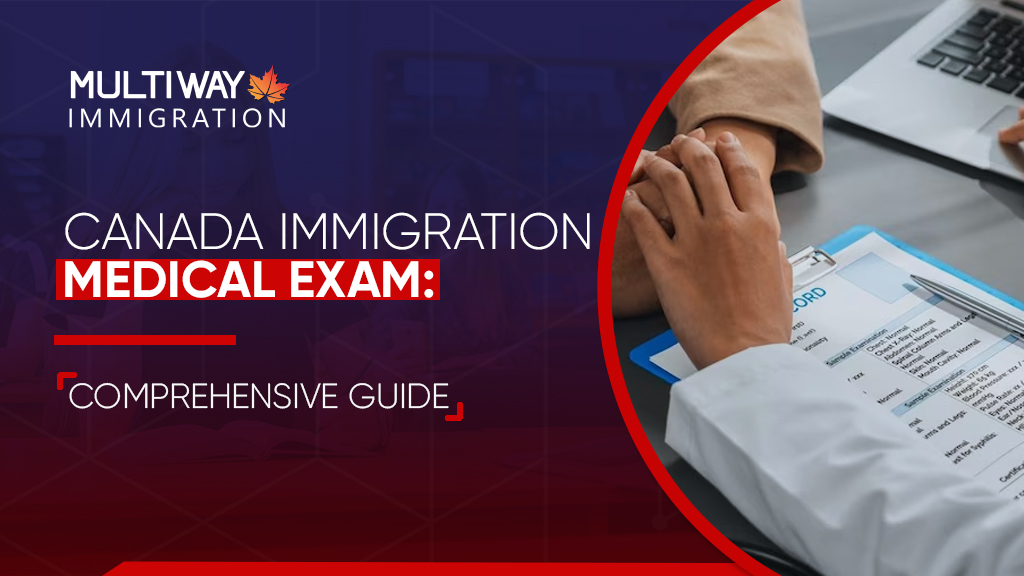
If you’re getting ready to move to Canada, part of the process involves undergoing a Canada immigration medical exam. This is to make sure you don’t have any health conditions that might be a risk to public health or safety. Getting ready for a medical exam can be a bit stressful, but with the right guidance and tips, you can make it easier.
In this article, we’ll go over some advice and tips from Trusted Immigration Services to help you get ready for your Canada immigration medical exam as part of your Canadian immigration process.
June 2021 update: Canada is exempting some in-Canada immigration applicants from the medical exam. Learn more.
What is a Medical Exam for Canadian Immigration?
A medical examination for Canadian immigration is conducted by a panel physician approved by IRCC to assess an individual’s health. The purpose is to determine if any health-related reasons might impact a person’s eligibility for immigration to Canada.
During an IRCC-approved Canada immigration medical exam, you’ll fill out a personal medical history questionnaire, undergo a physical examination, and undergo additional tests as recommended by your panel physician. If more information is needed, your physician might refer you to a specialist for further testing. You have the right to bring a chaperone with you to the appointment if you wish.
When attending your medical exam, make sure to bring proper identification, such as a passport or other government-issued ID. Also, carry information about your health, including a list of medications and any eyeglasses.
Depending on the Canadian immigration program, you may complete the medical exam before applying. In contrast, others require it after application (in these cases, IRCC will contact you and provide a deadline for completion).
Why does Canada Require The Medical Exam?
The main goal of the medical exam is to confirm a person’s medical eligibility for entry into Canada. If an individual poses a threat to public health or safety, or if their medical condition is likely to strain the Canadian healthcare system, their immigration application may face denial.
The examination is a crucial step in ensuring that those immigrating to Canada do not present potential risks to public health and can responsibly manage their healthcare needs.
List of Medical Exams for Canadian Immigration?
Every visa applicant, whether intending to stay temporarily as a live-in caregiver or a tourist, is required to undergo a medical examination as part of the Canadian immigration process. The procedure for the Canada immigration medical exam necessary for entry into Canada encompasses the following key steps:
Physical Examination
As part of this thorough medical assessment, all your vital organs will be examined. It’s important to inform the doctor about any significant health issues you’ve experienced. This comprehensive evaluation ensures a complete understanding of your health status and helps in determining your eligibility for immigration to Canada.
Chest X-rays
The purpose of this medical checkup is to identify any ongoing issues with vital organs or bodily functions. It’s important to note that the health of the fetus takes precedence over the mother’s, leading to the exclusion of X-ray tests for pregnant women. Additionally, there are specific tests that both the mother and the infant must undergo after childbirth to ensure comprehensive healthcare monitoring. This approach underscores the commitment to safeguarding the well-being of both mother and child during the immigration medical examination process.
Blood Tests
To be eligible for a Canadian permanent residence card, applicants need to show that they are in good health and do not have severe conditions such as tuberculosis, HIV, syphilis, and other potential health risks. The blood test plays a crucial role in diagnosing various conditions, providing a comprehensive assessment of the applicant’s health status. This health requirement ensures that individuals seeking permanent residence in Canada are in good health and do not pose risks to public health.
Urine Tests
Your urine sample will also be meticulously tested at a cutting-edge facility to assist in the diagnosis of any resulting health issues. This test may detect a variety of serious illnesses, including diabetes.
What Makes A Person Medically Inadmissible To Canada?
- Risk to Public Health and Safety: Conditions that are highly contagious or pose a threat to the health and safety of Canadian residents may render an individual medically inadmissible. This measure is in place to safeguard the well-being of the public and prevent the spread of potential health risks within Canada.
- Excessive Demand on Healthcare and Social Services: In Canada, where healthcare and social services are universally accessible and publicly funded, applicants may be deemed medically inadmissible if their health condition is expected to place an undue burden through Canada Family Sponsorship on the country’s healthcare and social services systems.
This evaluation considers the potential financial strain on the free healthcare system and its impact on wait times for Canadian citizens and permanent residents. Both Express Entry and Provincial Nominee Program applicants are subject to this assessment.
The excessive demand threshold, set just above CAD $20,000 per year, approximately three times the previous threshold established in 2018, serves as a benchmark. If an individual’s anticipated medical treatment costs exceed this threshold, they may be considered medically inadmissible.
It’s important to note that certain categories of applicants, such as sponsored spouses, partners, and dependent children, as well as refugees and protected persons, are exempt from the excessive demand provision.
Additionally, many temporary residence applications do not require a Canada immigration medical exam, excluding certain students, workers, and visitors from these admission criteria.
Who Needs a Medical Examination to Immigrate to Canada?
Certainly, the requirements for medical examinations differ based on whether an individual is applying for temporary residence (such as workers, students, and visitors) or for permanent residence in Canada.
Temporary Residents Planning to Stay Six Months or Less
If you plan to stay for six months or less, you typically won’t need a medical exam unless your intended job involves protecting public health. This includes positions with close contact with people, like healthcare workers, laboratory workers, and those in caregiving roles.
Other job titles may also require a Canada immigration medical exam, and agricultural workers from specific countries might need one if they’ve worked there in the past six months.
Temporary Residents Planning to Stay Six Months or More
If you plan to stay for six months or more, you may need a medical exam if you have lived in or visited certain countries or if your job involves public health protection. This also applies if you are applying for a parent or grandparent super visa.
Permanent Resident Applicants
Generally, all permanent resident applicants, including accompanying spouses, partners, and dependent children, are required to undergo a Canada immigration medical exam. However, there is a temporary policy in effect until December 28, 2021, exempting some low-risk applicants.
This exemption applies to those who have submitted a new application for permanent residence, have a pending application, have had a medical exam within the last five years with no public health risk, and have not left Canada for over six months in the last year to a country with a higher incidence of serious infectious diseases.
Accompanying family members in Canada may also be eligible for this temporary exemption if they meet the specified conditions. If these conditions are not met, a medical exam may be required.
Bottomline
The Canada Immigration Agency and Citizenship service warmly welcomes individuals who meet the immigration requirements, whether they are international students seeking further education or qualified workers meeting the same criteria.
For those pursuing Canadian permanent residency, medical tests are a mandatory component. These tests encompass a comprehensive physical examination, chest x-rays, blood work, and urinalysis. It’s essential to note that the results of your health assessment are valid for one year.
Also check out Canada Immigration Consultant
If you do not attain Canadian permanent residency within that timeframe, you may need to undergo the medical tests again; alternatively, contact the best Immigration Consultants for Canada. This ensures that individuals entering Canada as permanent residents meet the health standards established by the immigration authorities.
For those navigating the intricacies of immigration, finding the best immigration consultant Edmonton is paramount. A top-tier immigration consultant in Edmonton provides comprehensive immigration services, including expert guidance on Canada immigration services and Canada work permits.
With the support of a skilled immigration lawyer Edmonton, individuals can confidently pursue their immigration goals. Whether it’s understanding the nuances of Canada work permit or seeking legal counsel, the right immigration consultant in Edmonton ensures a smooth and informed journey through the immigration process.
FAQs
- List of medical exams for Canadian immigration?
There are two types of immigration medical exams: the standard medical exam and the streamlined medical exam.
- Blood tests
- Physical examination
- Urine tests
- X rays
- Blood pressure
- Measure your height
- Check your hearing
- Feel your abdomen
- Feel your pulse
- How to find a doctor for a Canada immigration medical exam?
The immigration medical exam can only be conducted by a panel physician authorized by Immigration, Refugees, and Citizenship Canada. Individuals undergoing the exam can select a panel physician from any location globally. It is essential to inform the chosen physician about the intended processing location of the immigration application so that the medical results can be appropriately sent to the designated office.
- Who needs a medical examination?
The requirements for medical examinations vary depending on whether an individual is applying for temporary residence, encompassing workers, students, and visitors, or for permanent residence in Canada.
- When to go to the Canada immigration medical exam center?
The processing time for the medical exam results in Canada PR applications typically takes about three months. Following this period, if no additional documents are required, IRCC (Immigration, Refugees and Citizenship Canada) will provide instructions on the subsequent steps in the application process.





